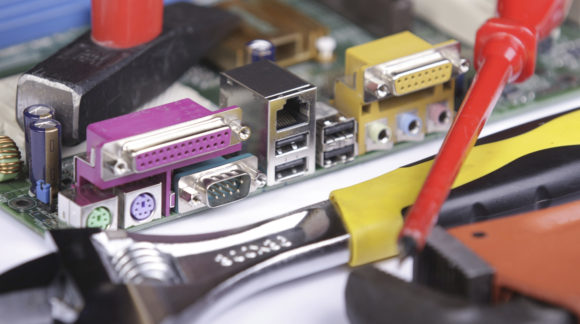Can You Upgrade Your Old Computer? Is it Worth It?

Common Computer Failures that are Easily Fixable
When your computer starts showing signs of aging it can be tempting to recycle the whole thing and start with a new set-up. Is a new computer really the best option? Is it cheaper to fix the broken parts in your current computer? It’s impossible to answer these questions as every computer is used for a different main purpose by a person with unique needs, desires and peeves.
Oftentimes you may be able to fix the part of your current computer that is giving you problems, but sometimes the fix isn’t worth the effort, or is un-fixable. When load times slow down and regular programs start to act funky on an older computer, it is usually related to one of the following, which can be solved relatively easily:
- Full hard drive – When the computer is slow starting up and completing normal day-to-day tasks it is possible that your hard drive is almost full. It is recommended that 33 percent of your hard drives space remain free.
- SOLUTION: Try deleting programs and files you no longer need, as well as relocating files to an external hard drive to make for more space.
- No memory – Installing additional memory on your computer is easy and relatively cheap (typically under $100).
- SOLUTION: Purchase and install additional memory on your computer.
- Cooling problem – Old computers need to cool down in order to function. Is your computer overheating? Is there a problem with the fan?
- SOLUTION: Try these tips to cool your computer down and fix a broken fan. Options for this fix include moving the computer to an open area, cleaning out dust and powering it down regularly.
- Viruses or malware – Even the best antivirus system in the world can’t prevent all bad programs. Hackers are developing newer, smarter and more realistic ploys everyday.
- SOLUTION: You can reinstall your system and run/download antivirus software to remove any problems you think are being caused by a hacker.
- Failure to update – While it may seem like regular computer updates are optional, they are critical to the wellbeing of your computer. Don’t get carried away with the “ask me later” button.
- SOLUTION: When prompted for a computer update, make time to let the system install and restart. Check for system updates and then run all critical updates. In addition, review the option updates and upgrade any necessary programs that you run often.
Typically, a computer has a life span of four years. Of course, with regular maintenance they can, and do, last much longer.
When a New Computer is the Best Option
Before purchasing a new computer ask yourself the following questions:
- Will I use the new features of this computer? An advanced graphic card isn’t really useful for a writer who only uses the word processing software. Make note of anything listed as a new benefit that won’t improve the way you use your computer.
- Does this computer come with anything I will not use? Carefully asses your needs and the programs and extras the new computer comes with. For instance, perhaps you don’t need the additional storage space.
- Does this model have good reviews? After a new computer model is released reputable companies will review the software and provide pro-cons lists. PC World, PC Mag and CNET are great places to start your research.
- Will purchasing, downloading, updating and setting up a new computer affect your workflow? Setting up a new computer can be a frustrating process. Don’t make the switch if you are particularly busy, trying to meet deadlines or need to be up and running by a certain date.
The benefits gained by upgrading your current computer or purchasing a new one are not as clear-cut as they may seem. The only way to determine the best financial option is to fully audit your system and compare prices for parts against prices and benefits of a new system.
Additional Resources
- How to upgrade an old PC, by pcworld.com
- Can you Upgrade an old XP PC to Windows 7, by zdnet.com
- Should I Upgrade my 8 Year old PC to Windows 8, by theguardian.com
- How Do I Know When to Upgrade my PC or Just Build a New One, by lifehacker.com
- Can you Upgrade your Old PC to Windows 8.1, by dummies.com
- How to Upgrade Computer Hardware, by ifitjams.com
- Should you Upgrade or Repair your Computer, by makeuseof.com
Videos
- Upgrading Memory (RAM) in an Old Computer-Video, by Crucial
- Upgrading your Old Laptop: Replacing RAM and SSDs! , by Tekzilla
- Upgrade Windows XP to Windows 7, by cnet.com
- How to Upgrade your Old Computer, by Britec09
Education
- Upgrading a Windows Operation System, by esxinc.com
- The Easy PC Upgrade Guide, by Dave James
- What to Do with Old Computers, by intel.com
- Upgrading Computer Labs to Meet Demands of Curriculum and Online Testing, by ncomputing.com
Books
- Upgrading and Fixing Computers, by Andy Rathbone
- Upgrading Windows 7 to Windows 10, by James Mitchell
- Repairing and Upgrading your PC, by Robert Bruce Thompson & Barbara Fritchman Thompson
- Upgrading and Repairing Laptops, by Scott Mueller
Apps
- How to get Software Updates for your Mac, by suppo
